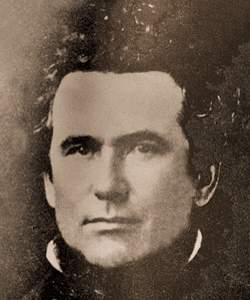Francis Harrison Pierpont (American National Biography)
Scholarship
Pierpont's role as governor of the Restored regime and his advice and encouragement to the nascent movement to create a separate state in western Virginia earned him the nickname "Father of West Virginia." When the statehood movement finally won its objective in June 1863, Pierpont, Unionist governor of old Virginia, turned down an invitation to serve as governor of West Virginia and moved the Restored government to Alexandria in northern Virginia. For the remainder of the war his tiny administration, representing only those few Virginia counties in Union-occupied areas of northern and eastern Virginia, struggled to maintain a semblance of authority despite encroachments by Confederate raiders and Federal generals and despite political officials, who now seemed embarrassed by the Lilliputian size of the Pierpont government. Their troubles notwithstanding, Restored Unionists, urged on by Governor Pierpont, held a constitutional convention in Alexandria in 1864 and drew up an antislavery constitution that anticipated many of the reforms of postwar Reconstruction. When the war ended in the spring of 1865, Governor Pierpont moved his Unionist state government to Richmond and began the thankless task of administering President Andrew Johnson's Reconstruction plan.
Richard Lowe, "Pierpont, Francis Harrison," American National Biography Online, February 2000, http://www.anb.org/articles/04/04-00790.html.





